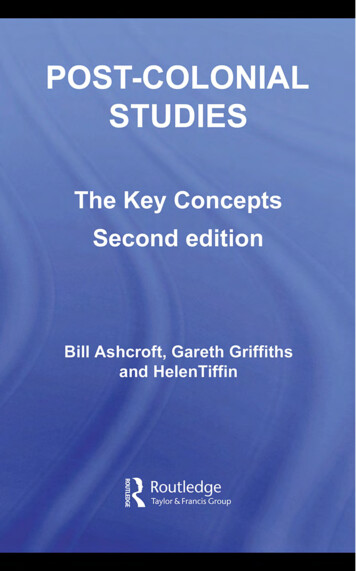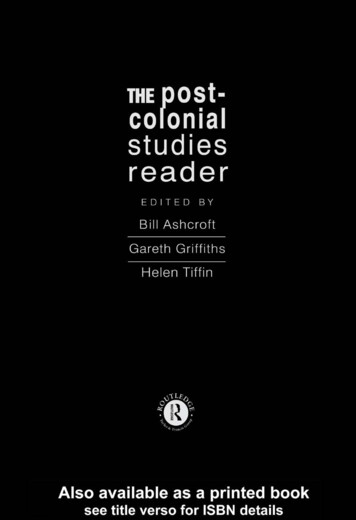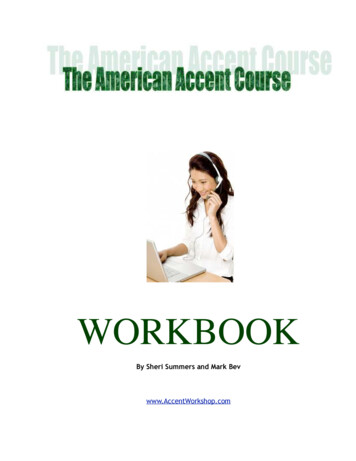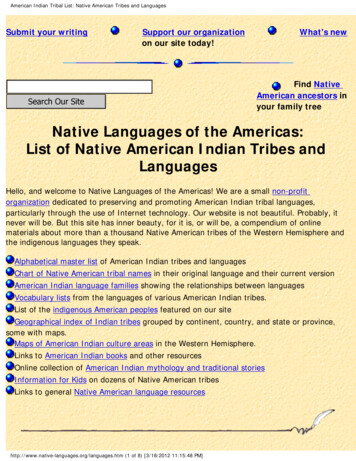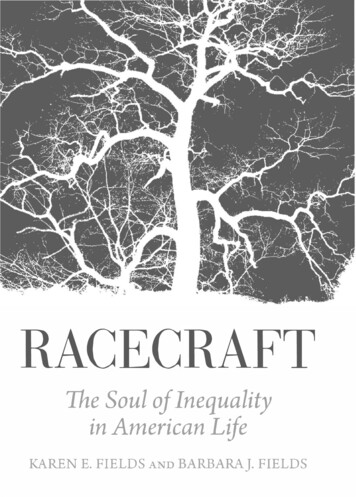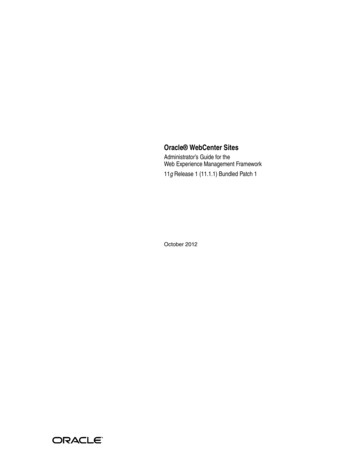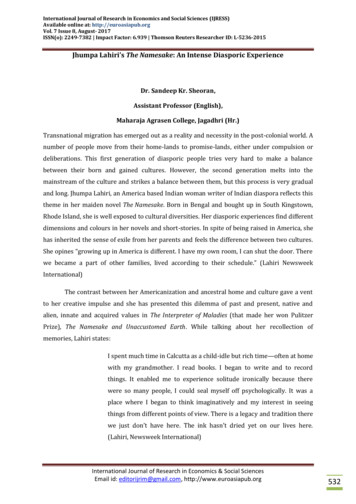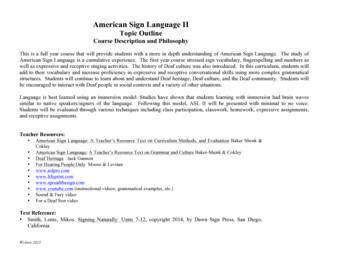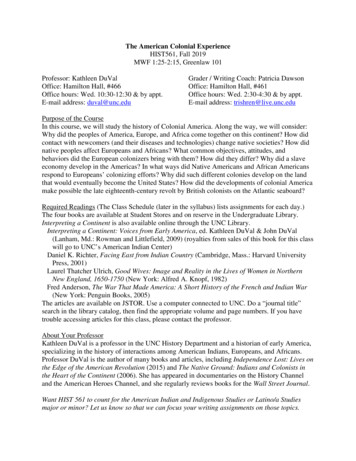
Transcription
The American Colonial ExperienceHIST561, Fall 2019MWF 1:25-2:15, Greenlaw 101Professor: Kathleen DuValOffice: Hamilton Hall, #466Office hours: Wed. 10:30-12:30 & by appt.E-mail address: duval@unc.eduGrader / Writing Coach: Patricia DawsonOffice: Hamilton Hall, #461Office hours: Wed. 2:30-4:30 & by appt.E-mail address: trishren@live.unc.eduPurpose of the CourseIn this course, we will study the history of Colonial America. Along the way, we will consider:Why did the peoples of America, Europe, and Africa come together on this continent? How didcontact with newcomers (and their diseases and technologies) change native societies? How didnative peoples affect Europeans and Africans? What common objectives, attitudes, andbehaviors did the European colonizers bring with them? How did they differ? Why did a slaveeconomy develop in the Americas? In what ways did Native Americans and African Americansrespond to Europeans’ colonizing efforts? Why did such different colonies develop on the landthat would eventually become the United States? How did the developments of colonial Americamake possible the late eighteenth-century revolt by British colonists on the Atlantic seaboard?Required Readings (The Class Schedule (later in the syllabus) lists assignments for each day.)The four books are available at Student Stores and on reserve in the Undergraduate Library.Interpreting a Continent is also available online through the UNC Library.Interpreting a Continent: Voices from Early America, ed. Kathleen DuVal & John DuVal(Lanham, Md.: Rowman and Littlefield, 2009) (royalties from sales of this book for this classwill go to UNC’s American Indian Center)Daniel K. Richter, Facing East from Indian Country (Cambridge, Mass.: Harvard UniversityPress, 2001)Laurel Thatcher Ulrich, Good Wives: Image and Reality in the Lives of Women in NorthernNew England, 1650-1750 (New York: Alfred A. Knopf, 1982)Fred Anderson, The War That Made America: A Short History of the French and Indian War(New York: Penguin Books, 2005)The articles are available on JSTOR. Use a computer connected to UNC. Do a “journal title”search in the library catalog, then find the appropriate volume and page numbers. If you havetrouble accessing articles for this class, please contact the professor.About Your ProfessorKathleen DuVal is a professor in the UNC History Department and a historian of early America,specializing in the history of interactions among American Indians, Europeans, and Africans.Professor DuVal is the author of many books and articles, including Independence Lost: Lives onthe Edge of the American Revolution (2015) and The Native Ground: Indians and Colonists inthe Heart of the Continent (2006). She has appeared in documentaries on the History Channeland the American Heroes Channel, and she regularly reviews books for the Wall Street Journal.Want HIST 561 to count for the American Indian and Indigenous Studies or Latino/a Studiesmajor or minor? Let us know so that we can focus your writing assignments on those topics.
AssignmentsClass Attendance: We will take attendance in class. You may have up to two unexcused absenceswithout penalty. Attendance will count for 10% of your final grade.In-class Participation: We will have discussions in class every day and especially on dayslabeled “Discussion.” You should come to class each day having completed that day’s readingassignment and being prepared to discuss it. If you do the reading and participate actively andconstructively in the discussions throughout the term, you will receive a good participationgrade. If you find that you have difficulty speaking in class, please see Professor DuVal todiscuss how you can participate more fully. We will explain in class how to make sure that werecord your attendance and participation. Participation will count for 10% of your final grade.Paragraph: When the syllabus lists a Paragraph Question for your group, at the beginning of thatclass turn in one typed, double-spaced paragraph of 150 to 200 words (approx. 1/2 page)answering the question. Because one of the goals of this class is to improve your writing, yourgrade will reflect the quality of the writing as well as the thoughtfulness of your answer to thequestion. The first sentence of the paragraph should be a strong thesis that answers the question.The following sentences should support that thesis. Include examples from the readings, explainhow they support your answer, and cite any sources with footnotes. The final sentence shouldsum up the paragraph. We will not accept late, un-typed, or inordinately short or longparagraphs. There will be a subsequent rewrite assignment for the first paragraph. The average ofyour paragraphs and the rewrite (five grades total) will count for 20% of your final grade.Document Worksheets: For every primary source that we read for class, fill out a DocumentWorksheet (on Sakai) and bring it to class. This writing will constitute approximately twentypages over the course of the semester but will not be graded for writing quality and will have noofficial value in our calculation of your final grade. However, we will check the worksheets, andthey will improve your participation and quiz grades and make it easier to study for the final.Reading Quizzes: Periodically throughout the semester, we will give reading quizzes. These willbe basic, factual questions. Your best four quiz grades will count. There will be no make-upquizzes. The four quizzes will count for 15% of your final grade.Paper: Guidelines for the paper will come early in the semester. It will be 1,500 to 2,000 words(about six double-spaced pages), and there will be an opportunity for extra credit through peerreview. The paper will count for 25% of your final grade.Final Exam: The final will have three parts and will be cumulative. The first part will focus on aprimary source that we read for class. The second part will ask you to interpret a new documentin terms of major themes we’ve discussed in class. The third part will be an essay question onThe War That Made America. You will write in a blue book. The final will count for 20% ofyour final grade. Our final is scheduled for Dec. 9 at noon. The makeup final will be Dec. 11 atnoon. Please note that we will not schedule any additional makeup finals.2
Class ScheduleWednesday, August 21What is Colonial History?Friday, August 23Discussion: Ancient and Medieval North AmericaReading Assignment:- Editors’ introduction, Interpreting a Continent (IAC) pp. 1-9- Osage Creation Account (Black Bear Clan Version), Recorded 1920s, IAC pp. 46-49- Great Law of the Iroquois League, c. 1300s, IAC pp. 87-93- Book of Genesis (excerpt), on SakaiMonday, August 26Some Ancient and Medieval North American SocietiesWednesday, August 28Western Europe before 1492Reading Assignment:- Samuel de Champlain on Founding Quebec, 1608, IAC pp. 94-96 (& p. 86 if you read French)- John Winthrop on Founding New England, 1630, IAC pp. 97-100- Laws for the Province of Pennsylvania, 1682, IAC pp. 101-105Paragraph Question (Group 1): Choose one of the primary documents from today or last Friday.How did the author (or authors) think a good society should function? A good topic sentencemight begin: “The Iroquois League founders believed that a society functioned best if . . .”Through the rest of the paragraph explain your theory, using examples and quotations from thatdocument. Summarize the main point of your paragraph in the final sentence.Friday, August 30West Africa before 1492Reading Assignment: Olaudah Equiano on Encountering Europeans, 1740s, IAC pp. 76-78Labor DayWednesday, September 4The Beginnings of American SlaveryFriday, September 6Early ImpressionsReading Assignment:- Christopher Columbus to Luis de Santángel, 1493, IAC pp. 18-23 (& p. 12 if you read Spanish)- The Requerimiento, 1533 Version, IAC pp. 53-56continued3
- Montagnais Indians on Their First Encounter with the French, Early 1500s, IAC pp. 67-68 (&p. 52 if you read French)Paragraph Question (Group 2): Choose one of the peoples from one of the primary documentsassigned for today (Columbus’s Spaniards, the Tainos whom Columbus met, the Spaniards whoread the Requerimiento, the French who met the Montagnais, or the Montagnais who met theFrench). What kind of impression were these people trying to convey to the people they weremeeting? A good topic sentence might begin: “Columbus and the Spaniards wanted to make theTainos think that they were . . .” Through the rest of the paragraph explain your argument, usingexamples and quotations from that document. Summarize the main point of your paragraph inthe final sentence.Monday, September 9Discussion: Facing East, Prologue & Chapters 1-3Reading Assignment:Richter, Facing East from Indian Country, Prologue & Chapters 1-3Paragraph Rewrite due for Group 1.Wednesday, September 11 Early Spanish Exploration and Its LessonsReading Assignment: Alvar Nuñez Cabeza de Vaca’s Shipwreck off the Texas Coast, 1528-36,IAC pp. 31-37Friday, September 13Spanish Exploration North of MexicoReading Assignment: Pedro de Castañeda de Nájera on the Search for the Seven Cities of Cíbola,1540, IAC pp. 57-64Paragraph Question (Group 3): Pick Cabeza de Vaca or Castañeda. Which influenced thisauthor’s opinion of North America more: his reasons for coming or experiences once here? Agood topic sentence might begin: “Alvar Nuñez Cabeza de Vaca’s reasons for coming to NorthAmerica influenced his opinion more than experiences once here.” Through the rest of theparagraph explain your argument, using examples and quotations from that document.Summarize the main point of your paragraph in the final sentence.Monday, September 16RivalsReading Assignment: Francisco L. de M. Grájales’s Account of the Conquest of Florida, 1565,IAC pp. 233-2414
Wednesday, September 18 New MexicoParagraph Rewrite due for Group 2.Friday, September 20Discussion: Early American SlaveryReading Assignment:- Hans Sloane Observes Jamaica, 1687-1689, IAC pp. 119-127- François Froger’s Plan of Ft. St. Jacques, Gambia, 1695, IAC pp. 155-156- New Netherland Act Emancipating Certain Slaves, 1644, IAC pp. 157-158- Stephanie E. Smallwood, “African Guardians, European Slave Ships, and the ChangingDynamics of Power in the Early Modern Atlantic,” WMQ 64 (2007): 679-716Paragraph Question (Group 1): Choose one of Smallwood’s main arguments and explain it.Monday, September 23The British SettleReading Assignment:- John Smith on the Powhatans, 1607-1616, IAC pp. 69-72- Virginia Codes Regulating Servitude and Slavery, 1642-1705, IAC pp. 159-164Viewings of the film Black Robe will be scheduled for the week of September 23.Wednesday, September 25 Algonquians, Hurons, and New FranceReading Assignment:- John Eliot’s Translation of the Bible into the Massachusett Language, 1663, IAC pp. 73-75- Thomas Campanius Holm’s Engraving of New Sweden, 1640s, IAC pp. 117-118Paragraph Rewrite due for Group 3.Friday, September 27Paper Writing Workshop for Group 1Monday, September 30In-class film: Africans in AmericaIntroductory Paragraph due for Group 1.Wednesday, October 2New EnglandReading Assignment: Letter from Marie de L’Incarnation to Her Son, 1667, IAC pp. 194-1985
Friday, October 4Colonial WomenReading Assignment: María de Jesús de Agreda and Catherine Tekakwitha, 1600s, IAC pp. 213215Monday, October 7The Iroquois and New NetherlandWednesday, October 9The Carolinas and Their NeighborsReading Assignment: Afro-Floridians to the Spanish King, 1738, IAC pp. 179-180 (& p. 154 ifyou read Spanish)Paper due for Group 1.Friday, October 11Discussion: Good WivesReading Assignment: Ulrich, Good Wives (Read the Introduction, the introduction to each Part,and the Afterword, plus the Part corresponding to your Group number.)Paragraph Question (Group 2): What is Ulrich’s main argument about the lives of women inNew England? Explain.Monday, October 14War in the Southeast and SouthwestReading Assignment:- Antonio de Otermín Describes the Pueblo Revolt, 1680, IAC pp. 252-260 (& p. 232 if youread Spanish)- Saukamappee on the Coming of Horses, Guns, and Smallpox, 1700s, IAC pp. 128-132Fall BreakMonday, October 21Discussion: Praying TogetherReading Assignment:- Richter, Facing East, Chapter 4- Annette Laing, “‘Heathens and Infidels’? African Christianization and Anglicanism in theSouth Carolina Low Country, 1700-1750,” Religion & American Culture 12 (2002): 197-228Paragraph Question (Group 3): Choose one of Laing’s main arguments and explain it.Wednesday, October 23The Eighteenth-Century Great PlainsFriday, October 25Paper Writing Workshop for Group 2Monday, October 28Great Lakes & LouisianaReading Assignment:- Jacques Marquette on Descending the Mississippi River with Louis Joliet, 1673, IAC pp. 38-41- Father J. Gravier Describes Indian Conversions at the Illinois Mission, 1694, IAC pp. 206-212(& p. 190 if you read French)Introductory Paragraph due for Group 2.Wednesday, October 30Paths Not TakenReading Assignment: Antoine S. Le Page Du Pratz Describes French Conflict with the Natchez,1729, IAC pp. 261-2706
Friday, November 1FilmMonday, November 4Discussion: Facing East, Chapters 5-6 & EpilogueReading Assignment: Facing East, Chapters 5-6 & EpilogueParagraph Question (Group 1): Why is Chapter 6 called “Separate Creations”? Explain.Wednesday, November 6 Comparative Eighteenth-Century SlaveryReading Assignment: Advertisement for a Slave Sale, Charleston, c. 1770s, IAC pp. 186-187Paper due for Group 2.Friday, November 8Paper Writing Workshop for Group 3Monday, November 11Discussion: “Two Princes of Calabar”Reading Assignment:- Randy Sparks, “Two Princes of Calabar: An Atlantic Odyssey from Slavery to Freedom,”William & Mary Quarterly 59 (2002): 555-584- Advertisement for a Slave Sale, Charleston, c. 1770s, IAC pp. 186-187Paragraph Question (Group 2): Choose one of Sparks’s main arguments and explain it.Introductory Paragraph due for Group 3.Wednesday, November 13 Slavery, Resistance, and Slave LifeReading Assignment:- Runaway Advertisements, Mid-1700s, IAC pp. 144-147- Phillis Wheatley’s “On Being Brought from Africa to America,” 1773, IAC pp. 228-229Friday, November 15Discussion: “Taking the Trade”Reading Assignment: Cornelia Hughes Dayton, “Taking the Trade: Abortion and GenderRelations in an Eighteenth-Century New England Village,” William & Mary Quarterly 48(1991): 19-49Paragraph Question (Group 3): Choose one of Dayton’s main arguments and explain it.Monday, November 18The Mid-Eighteenth CenturyReading Assignment:- Benjamin Franklin Becomes a Printer, 1714-1723, IAC pp. 133-140- Eliza Lucas to Mrs. Boddicott, 1740, IAC pp. 141-143- Mary Christina Martin’s Case before the German Society of Pennsylvania, 1772, IAC pp. 148149Wednesday, November 20 Lecture & Discussion: Seven Years’ WarReading Assignment:- Anderson, Prologue & Parts 1-2Paper due for Group 3.7
Friday, November 22Lecture & Discussion: Seven Years’ War, continuedReading Assignment:- Anderson, Parts 3-4- George Washington Recalls His Defeats at Fort Duquesne, 1754-1755, IAC pp. 271-277- Louis-Antoine de Bougainville’s Journal of the Seven Years’ War, 1756, IAC pp. 278-283- Susannah Johnson Recalls Her Captivity, 1754-1757, IAC pp. 216-227Monday, November 25ConsequencesReading Assignment:- Anderson, Epilogue- Pontiac’s Speech to an Ottawa, Potawatomi, and Huron Audience, 1763, IAC pp. 79-83- Ohio Indians Talk to the British, 1764, IAC pp. 284-285Thanksgiving BreakMonday, December 2The West at Mid-CenturyReading Assignment:- Father Junípero Serra Writes from San Diego, 1770, IAC pp. 108-111- Catherine the Great’s Response to a Petition to Establish a Russian Colony, 1788, IAC pp. 112114- Spiritual and Temporal Guidelines for a Texas Mission, Late 1700s, IAC pp. 150-152Wednesday, December 4“American” Culture in 1763Final Exam:Wednesday, December 9, noon, Greenlaw 101Final Makeup:Friday, December 11, noon, Greenlaw 1018
In what ways did Native Americans and African Americans . pages over the course of the semester but will not be graded for writing quality and will have no . Letter from Marie de L’Incarnation to Her Son, 1
